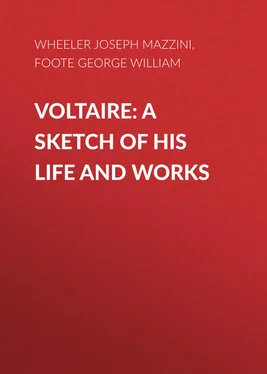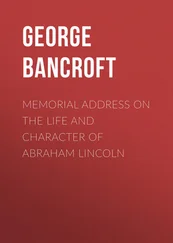George Foote - Voltaire - A Sketch of His Life and Works
Здесь есть возможность читать онлайн «George Foote - Voltaire - A Sketch of His Life and Works» — ознакомительный отрывок электронной книги совершенно бесплатно, а после прочтения отрывка купить полную версию. В некоторых случаях можно слушать аудио, скачать через торрент в формате fb2 и присутствует краткое содержание. Жанр: foreign_antique, foreign_prose, Биографии и Мемуары, на английском языке. Описание произведения, (предисловие) а так же отзывы посетителей доступны на портале библиотеки ЛибКат.
- Название:Voltaire: A Sketch of His Life and Works
- Автор:
- Жанр:
- Год:неизвестен
- ISBN:нет данных
- Рейтинг книги:5 / 5. Голосов: 1
-
Избранное:Добавить в избранное
- Отзывы:
-
Ваша оценка:
- 100
- 1
- 2
- 3
- 4
- 5
Voltaire: A Sketch of His Life and Works: краткое содержание, описание и аннотация
Предлагаем к чтению аннотацию, описание, краткое содержание или предисловие (зависит от того, что написал сам автор книги «Voltaire: A Sketch of His Life and Works»). Если вы не нашли необходимую информацию о книге — напишите в комментариях, мы постараемся отыскать её.
Voltaire: A Sketch of His Life and Works — читать онлайн ознакомительный отрывок
Ниже представлен текст книги, разбитый по страницам. Система сохранения места последней прочитанной страницы, позволяет с удобством читать онлайн бесплатно книгу «Voltaire: A Sketch of His Life and Works», без необходимости каждый раз заново искать на чём Вы остановились. Поставьте закладку, и сможете в любой момент перейти на страницу, на которой закончили чтение.
Интервал:
Закладка:
In his first play, Œdipe , appeared the celebrated couplet:
“Nos prêtres ne sont pas ce qu’un vain peuple pense!
Notre crédulité fait toute leur science.” 2 2 “Our priests are not what foolish people suppose; all their science is derived from our credulity.”
These lines were afterwards noted by Condorcet as “the first signal of a war, which not even the death of Voltaire could extinguish.” It was at this period that he first took the name of Arouet de Voltaire. He produced two more tragedies, Artemire and Mariamne ; a comedy, The Babbler ; and prepared his world-famous Henriade. A portrait, painted by Largillière at about this period, has often been engraved. It exhibits a handsome young gentleman, full of grace and spirit, with a smiling mouth, animated eyes, intellectual forehead, and a fine hand in a fine ruffle.
HEGIRA TO ENGLAND
The story of how Voltaire came to England is worth the telling, as it illustrates the condition of things in France in the early part of last century. Voltaire left France for England, which his acquaintance with Lord Bolingbroke induced him to desire to visit. It was his Hegira, whence he returned a full-fledged Prophet of the French. He went a poet, he returned a philosopher. Dining at the Duke of Sully’s table he presumed to differ from the Chevalier de Rohan – Chabot, a relative of Cardinal Rohan. The aristocrat asked, “Who is that young fellow who talks so loudly?” “Monsieur le Chevalier,” replied Voltaire, “it is a man who does not bear a great name but who knows how to honor the name he does bear.” 3 3 Some of the accounts say that Voltaire said, “You, my lord, are the last of your house; I am the first of mine.”
It was insufferable that the son of a bourgeois should thus speak his mind to a Rohan. A few days afterwards, when again dining with the Duke, he was called out by a false message, and seized and caned by ruffians until a voice cried “Enough.” That word was a fresh blow, for the young poet recognised the voice of the Chevalier. He returned to the Duke and asked him to assist in obtaining redress. His grace shrugged his shoulders and took no further notice of this insult to his guest. Voltaire never visited the Duke again, and, it is said, erased his ancestor’s name from the Henriade . He was equally unsuccessful in seeking redress from the Regent. “You are a poet, and you have had a good thrashing; what can be more natural?” He retired, to study English and fencing; and reappeared with a challenge to the Chevalier, who accepted it, but informed his relations. It was against the law for a commoner to challenge a nobleman. Next morning, instead of meeting de Rohan, he met officers armed with a lettre de cachet consigning him to the Bastille. After nearly a month’s incarceration he was liberated on condition that he left the country. Having no wish to spend a second year in prison, he had himself applied for permission to visit England. Voltaire felt keenly the indignity to which he had been subjected. In a letter of instruction written from England to his agent he says: “If my debtors profit by my misfortune and absence to refuse payment, you must not trouble to bring them to reason: ’tis but a trifle.” Yet a book has been written on Voltaire’s avarice.
Voltaire was conducted to Calais and arrived in England on Whit-Monday, 1726. He landed near Greenwich and witnessed the Fair. All seemed bright. The park and river were full of animation. Here there was no Bastille, no fear of the persecution of the great or the spies of the police. He had excellent introductions. Bolingbroke he had met in exile at La Source in 1721, and he had learnt to regard the illustrious Englishman who possessed “all the learning of his country and all the politeness of ours.” Voltaire, like Pope, may be said to have been, at any rate for a time, an eager disciple of the exiled English statesman. Now Voltaire was the exile; Bolingbroke, for a while, the host, at Dawley, near Uxbridge. But he had other English friends, notably Mr. (afterwards Sir Everard) Falkener, an English merchant trading in the Levant, from whose house at Wandsworth most of his letters are dated. For Sir Everard, Voltaire always retained the warmest feelings of friendship, and forty years later returned hospitality to his sons.
Voltaire spent two years and eight months in England, living during part of the time in Maiden Lane, Covent Garden, and during another part at Wandsworth. This visit was probably the most important event in his life. It was here he lit the torch of Freethought with which he fired the continent. Here he mastered the arguments of the English deists, Bolingbroke, Toland, Tindal, Shaftesbury, Chubb, Collins, and Woolston, which he afterwards used with such effect. Here he saw the benefits of parliamentary government. Here he imbibed the philosophy of Locke and the science of Newton. Indeed it may be said there is hardly one of Voltaire’s important works but bears traces of his visit to our country. Yet of this momentous epoch of his life the records are scanty. When he grew famous every letter and anecdote was preserved, but in 1727 Voltaire was but a young man of promise. Carlyle, in the tenth book of his Frederick the Great , says: “But mere inanity and darkness visible reign in all his Biographies over this period of his life, which was above all others worth investigating.” Messrs. J. C. Collins and A. Ballantyne have since done much to elucidate this noteworthy period.
Pope was one of the persons Voltaire desired to see. He had already described him as “the most elegant, most correct, and most harmonious poet they ever had in England.” Pope could only speak French with difficulty, and Voltaire could not make himself understood. The result being unsatisfactory, Voltaire did not seek further company until he had acquired the language. An anecdote in Chetworth’s History of the Stage relates that he was in the habit of attending the theatre with the play in his hand. By this method he obtained more proficiency in the language in a week than he could otherwise have obtained in a month. Madame de Genlis had the audacity to assert that Voltaire never knew English, yet it is certain he could, before he was many months in this country, both speak and write it with facility. By Nov. 16, 1726, he wrote to Pope, after that poet's accident while driving near Bolingbroke’s estate at Dawley. In writing to his friend Thieriot, in France, he sometimes used English, for the same reason, he said, that Boileau wrote in Latin – not to be understood by too curious people. Voltaire is said to have once found his knowledge of English of practical use. The French were unpopular, and in one of his rambles he was menaced by a mob. He said: “Brave Englishmen, am I not already unhappy enough in not having been born among you?” His eloquence had such success that, according to Longchamp and Wagnière, the people wished to carry him on their shoulders to his house.
While in this country he wrote in English a portion of his tragedy Brutus , inspired by and dedicated to Bolingbroke, and two essays, one on the Civil Wars of France, and one on Epic Poetry. In the introduction to the essays he expresses his conception of his own position as a man of letters in a foreign country. As these essays, although popular at the time, are now rare, I transcribe a paragraph or two from them:
“The true aim of a relation is to instruct men, not to gratify their malice. We should be busied chiefly in giving a faithful account of all the useful things and extraordinary persons, whom to know, and to imitate, would be a benefit to our country. A traveller who writes in that spirit is a merchant of a nobler kind, who imports into his native country the arts and virtues of other nations.”
Читать дальшеИнтервал:
Закладка:
Похожие книги на «Voltaire: A Sketch of His Life and Works»
Представляем Вашему вниманию похожие книги на «Voltaire: A Sketch of His Life and Works» списком для выбора. Мы отобрали схожую по названию и смыслу литературу в надежде предоставить читателям больше вариантов отыскать новые, интересные, ещё непрочитанные произведения.
Обсуждение, отзывы о книге «Voltaire: A Sketch of His Life and Works» и просто собственные мнения читателей. Оставьте ваши комментарии, напишите, что Вы думаете о произведении, его смысле или главных героях. Укажите что конкретно понравилось, а что нет, и почему Вы так считаете.






![William Frith - John Leech, His Life and Work. Vol. 1 [of 2]](/books/747171/william-frith-john-leech-his-life-and-work-vol-thumb.webp)
![William Frith - John Leech, His Life and Work, Vol. 2 [of 2]](/books/748201/william-frith-john-leech-his-life-and-work-vol-thumb.webp)



